Memoirs & Diaries - A Padre's Story
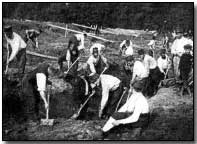 The war treated me kindly. I was wounded, gassed, and
had shell-shock, but they were all relatively slight. I received
decorations which thousands earned quite as genuinely without recognition.
The war treated me kindly. I was wounded, gassed, and
had shell-shock, but they were all relatively slight. I received
decorations which thousands earned quite as genuinely without recognition.
As a combatant private and a brigade chaplain, I was in almost every part of the line on the Western Front. I came through with a great pride in men and a bitter hatred of war.
Memories besiege my mind. I can only select. I remember vividly certain bonny lads of twelve or thirteen haunting our billets behind the line, touting for buyers of their sisters' bodies at 50 centimes. I remember also a mother offering her daughter of sixteen in a whisper as she handed out eggs and chips.
During one spell in the line a bantam battalion was on our right. They were sturdy fighters. One day a party of Prussians raided them and a huge German ran off with a bantam under his arm.
Our platoon sergeant during one period was an old Regular. He could carry drink well from long practice. Once when we were out of the line someone made a bet of 20 francs that he could not get drunk on French beer. He tried hard all one night. They carried him to his billet at closing time. He was very ill, but as sober as a judge.
There was no romance in the War for private soldiers. There were great days when there were comfortable latrines available and when the bread ration was four to a loaf. Such days were infrequent.
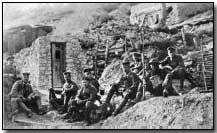 Life
was unutterably boring. I was a company runner, but most men had an
almost unchangeable routine.
Life
was unutterably boring. I was a company runner, but most men had an
almost unchangeable routine.
We knew nothing about the meaning of our masterly inactivity. We received shells but saw no Germans save on occasional raids.
We felt that the War would outlast us all. Most men longed for a Blighty. When I became a chaplain I saw more actual fighting. I think of Arras. I was with the first brigade that lived in the catacombs under the town.
They were very deep below the ground and were lighted by electricity. They were huge, irregular caves out of which the stone of which the cathedral was built had been hewn. They were connected by passages with each other and with the sewers under Arras.
They were very silent, for men went out to work or fight and came back to sleep. We rested there before the Easter Battle of Arras, 1917.
In front of Arras I saw my first German booby traps. They had withdrawn quietly from their line, destroying most of their dug-outs as they went.
Our troops thrust out patrols to discover their new line. I visited a new company headquarters. In the corner of the dug-out there was a heap of dirt out of which a beautifully carved crucifix projected. I reached down to examine it.
"Good God! Don't touch it!" the company commander yelled. The bottom of it was attached to a bomb.
Battalion headquarters was in a huge German dug-out which had four entrances. Three had been destroyed and the fourth partially destroyed. In the main room there was a huge fire-place with a wide chimney.
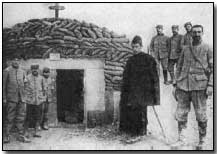 In
the chimney the brigade bombing officer found a large bomb and in other
parts of the dug-out eight other bombs.
In
the chimney the brigade bombing officer found a large bomb and in other
parts of the dug-out eight other bombs.
A fire would have exploded the lot. In my unit there was a superstition that it was dangerous to carry French cartridges.
I was going round with the C.O. during the later stages of the Easter show when we passed a dead soldier of our battalion. The C.O. examined his pockets and, curiously enough, found a clip of French cartridges.
We spent eight months in and out of shell-hole positions in front of Ypres. Often we came out less than half as strong as we went in. It was an animal and often beastly life. The wonder was that there was as much morality behind the lines after such an existence.
In this area I had my first experience of sportsmanship among Germans. The Menin road between Hooge Tunnel and Clapham Junction (a captured pillbox) was a raised road. Any working party setting foot on it was strafed by machine-gunners who had it under direct observation.
As a result, troops journeyed under the shelter of the right bank of the road. In one show for a number of hours I made journeys with wounded men down the road itself. Machine guns never opened on us. Round the entrance to the tunnel, however, we lost over seventy stretcher bearers by shell-fire.
One of the men we carried out was Private C. of a Cornish regiment. He was only twenty. Later I saw him at the advanced dressing station. He had one leg blown off, the other badly injured, and other wounds in the body and face.
The doctor said he could not live, but he did. I was with him as they dressed his wounds. Only seldom did he groan. Each time he looked up and said, "S-sorry , padre." He had a stutter. When they had almost finished he gave a twisted smile and said, "P-padre, the c-c-canary that k-kicked me had g-got hob nails in its b-boots." I saw him later in England. I wish I could see him again.
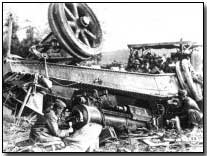 Early
in I9I8 we took over from the French down south. It was a very quiet
part of the line.
Early
in I9I8 we took over from the French down south. It was a very quiet
part of the line.
Here the brigade was reorganized on a three-battalion basis. Each battalion was 800 strong. A Scottish unit came into my brigade and I lived with them. The officers and men were a great lot!
After a time the second in command, Major F., took charge. What a man he was! He stood over 6 feet. The men worshipped him. He was in charge of the first daylight raid. On that occasion he arranged a sweepstake for the men on the number of prisoners that would be captured.
Soon after joining our brigade, he had an attack of jaundice. It was a good Blighty, but he would not go down. Each night he had a "bivvy" put up on the top of headquarters dug-out and there he slept. One day in the communication trenches he met a new youngster carrying a dixie and stopped him.
"Well, my lad, are you a
Boche-eater?"
The lad, quite puzzled, said "No, sir."
"What the devil are you then?"
"Please, sir, I'm mess orderly."
We were to conduct a raid in front of Moy. "Mad Macduff," as the men lovingly called him, prepared the party.
There were two belts of wire, according to information received. A Bangalore torpedo was to be inserted quietly under the first. The two men were to run back. It would blow a gap. They were to rush through and insert the second torpedo which in turn would be exploded.
Then, according to programme, the party would rush through, snatch a prisoner and return. The whole thing was rehearsed again and again behind the lines. On the night of the raid the party paraded, well camouflaged with grass-covered coats.
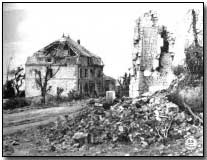 There
were to be two officers on the raid, one of whom was an Engineers officer.
Actually, there were five who took some part in the raid. "Macduff"
went with them.
There
were to be two officers on the raid, one of whom was an Engineers officer.
Actually, there were five who took some part in the raid. "Macduff"
went with them.
The raid involved a journey of 1,000 yards along a bit of a valley to a place where the German line was a fair distance away. The night was quiet. The party went forward and lay down.
"Macduff" went ahead further to examine the wire. He found a gap in the rear belt. He returned. He stood upright and passed along the line telling the good news. He spoke in an ordinary conversational tone, which seemed strangely loud.
A machine gun opened and the bullets seemed to be right at the party. Every head save "Macduff's" was buried. He never even ducked. Instead, in level tones he said, "Away and have a course, Boche. You can't shoot for toffee. We'll show you how to shoot."
Shortly after, the signal was given, our barrage opened on the German line, the gap was made in the wire and through the men went. At the head of them was "Macduff." There was a German machine gun right opposite the gap, but the gunner was too stupefied to open fire.
The major got him. He was first in the trench. He was the only casualty. It was soon over. The prisoner was a poor frightened youngster. As soon as the party knew "Macduff" was injured they wanted to kill the prisoner. I stopped one of them with difficulty.
We were soon journeying along the safer valley. The stretcher bearers rested a while. I offered to relieve one, but no one would give way. The wound was an abdominal wound and the end was obviously near.
He smiled at me and said,
"Did they get the Boche?"
"Yes."
"Good! Good!" he whispered.
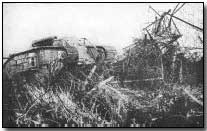 He
was carried into an improvised aid post in front of the line. He lived
but a few minutes. He whispered once, "The Boche!" and it was all
over.
He
was carried into an improvised aid post in front of the line. He lived
but a few minutes. He whispered once, "The Boche!" and it was all
over.
I shall never forget that night. I went round the posts. Men called out, "Padre, 'Macduff's' no deid! He's no deid!" More than one wept. We buried him at Montescourt.
The raiding party made a coffin out of biscuit-box wood and lined it with tin-foil. Contact with Major F. is one of my most poignant memories. We knew each other but a brief time, but we were friends. He was kind, generous, and a true gentleman. I am proud to have known him.
The weeks passed - quiet nerve-racking weeks. Again and again we manned battle positions. Again and again there were false alarms. Our transport lines were at Remigny. There were football matches on March 20th. In the mess that night there was once again certainty that It would happen at dawn.
The company commander in my mess was losing his nerve. That night he was dreadful. Again and again he said he knew he would get killed next day. He drank neat whisky to steady himself. Presently we were alone. The others could not stand it any longer.
"I can't help it, padre, I'm a damned coward. I know I am, but I shall get killed to-morrow."
He was not drunk, but his nerve was going. More than once during that evening he had said, "The men are fine, but I'm a white-livered cur."
At last I persuaded him to go to bed. Next day early on he was hit in the leg. He carried on, rallying his men and retaking captured machine guns until he was killed.
That night was quieter even than usual. Just as dawn was breaking I went to a cooker for some tea. As soon as I returned to my hut the barrage opened. It was incredible. My hut was near the cross-roads at the top of the main street of the village.
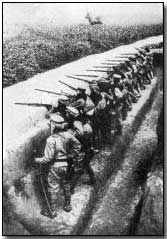 I
bolted for the nearest dugout. The men were getting their blankets
rolled in bundles of ten. Four men had to fall in and take them to
B.H.Q., past those cross-roads. We never knew whether they arrived.
The men went out with blanched faces to find their battle positions.
I
bolted for the nearest dugout. The men were getting their blankets
rolled in bundles of ten. Four men had to fall in and take them to
B.H.Q., past those cross-roads. We never knew whether they arrived.
The men went out with blanched faces to find their battle positions.
One of them had mislaid his tin-hat. I gave him mine. I was without until nightfall. I went to other dug-outs. In one, just as they were filing out a boy went mad and shrieked. He was quickly quietened. My nerves were dreadfully shaken. For half an hour I skulked in the deep dug-out which the signallers occupied.
They had had no contact with anywhere after the first few minutes. I would like to have stayed there, but my faithful batman said headquarters would wonder why I had not appeared. He knew I was funking, and that was how he helped me.
It was now about 10 a.m. Headquarters was opposite the aid post. There was no aid post left. In the dug-out the C.O. was just arranging to fall back to try and find contact with Division. I remained behind with my batman and a man detailed to watch the precious blankets.
I thought we could direct stragglers. There were no stragglers. The Germans were obviously moving their guns forward. After about a quarter of an hour the blanket guard ran in shouting, "Good God! padre, the Boche are coming down the hill."
We bolted out the back. Our headquarters was less than a hundred yards from the top of the street. We pelted on. We passed no infantry , but just before we reached the canal at Jussy we passed a battery of 18-pounders plugging away steadily.
By nightfall Jussy was our headquarters. The sky seemed full of Fokkers. During the first two days I didn't see a single British 'plane. For days after, the Germans were overwhelmingly more numerous.
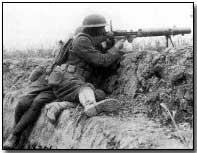 At
one time the Germans were one side of a railway embankment and our men the
other.
At
one time the Germans were one side of a railway embankment and our men the
other.
They had bombs. Ours had scarcely any ammunition. On the fifth day my brigade consisted of twelve officers and not more than 260 men out of three battalions.
Of course, some may have got with other units, but the casualties were terrific and none had joined us from the battalion that was in the line when the show opened. For some days it was a case of running back to dig fresh positions, making a brief stand, then back again.
Demoralization seemed complete. The men were hungry, tired, and hopeless.
At last, after several days, we were in front of Noyon. One of our R.A.M.C. units was marching into the barracks when a 'plane swooped down and bombed them. There were over a score of casualties. Ten days or so later we were talking about this in mess. There was a young lieutenant there who had been with the Air Force for instruction.
He turned white as death. The 'plane that bombed our men was a British 'plane and he had been in it. They believed the troops were Germans.
After what seemed an eternity, we were crowded into lorries and rushed away from the line. The French had come forward to relieve us, and we thought we were going to safety. We were soon disillusioned. We were being rushed up to the front of Amiens.
Our whole division was little more than the strength of a battalion. We were rushed as a composite battalion straight into the line. Our uniforms were all sorts. Our R.A.M.C. remnants were not with us. We had no stretchers. We were in despair. We were dug-in on the banks caused by plateaux which rose in terraces.
Quite suddenly a tremendous bombardment started. It lasted two hours. Then equally suddenly it ceased and no attack came. I walked along the banks that were occupied.
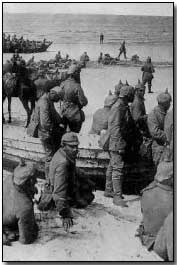 In
one "cubby" sat a soldier without a head. In another a sergeant lay
asleep from exhaustion. He had slept through the barrage. Soon a
lot were asleep. That night we were finally relieved by the Aussies.
They came up fresh and singing.
In
one "cubby" sat a soldier without a head. In another a sergeant lay
asleep from exhaustion. He had slept through the barrage. Soon a
lot were asleep. That night we were finally relieved by the Aussies.
They came up fresh and singing.
We had thought the War was over and we were licked, but as we went back we saw, to our amazement, a newly erected prisoners' barbed-wire cage. By the next night it was filled with Germans.
Three months in hospital and in England followed. Then once more in the line until a week before the end. I am glad to cut this part of the story short. The moral of new drafts of officers and men was often very bad. There were incidents one would like to forget.
I remember a show at the end of October. We were believed to have an easy task, but camouflaged machine guns made the event a tragic fiasco. There was an aid post on a sunken road which was safe until you turned the bend that led into the village we were to capture.
Then it was under direct observation and almost point-blank range from machine guns in and round the village church tower. I had taken a casualty back as dawn was breaking. My nerve had gone. Instead of returning to my work, I cowered in the side of the road trembling like a leaf.
When walking wounded came I walked as though I was going forwards and then when they had passed I hid again. This went on for half an hour. Then it was getting light. I took hold of myself, and, keeping to the side of the road, walked right down to the outskirts of the village.
Not until I saw a German did I realize that they were still in occupation. Fortunately, he had not seen me. The rest of the day was spent carrying wounded. Once, perforce, we had to come up that sunken road. The machine guns kept quiet till we rounded the bend in the road.
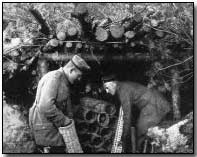 I
took six frightened boys back to their company. They were hiding and
might have been shot for cowardice.
I
took six frightened boys back to their company. They were hiding and
might have been shot for cowardice.
I used a number of Germans as stretcher bearers. We dressed one boy's wound as he lay in the sunken road. A German lay flat on the far side. I lay on the near side.
He died when we dragged him to a sheltered spot. The German was a man of about fifty. He wept like a child. I asked him why in French. He said he had had four sons killed, and that boy was like his youngest. I sent him back to safety.
I could write much more. I hate war. I fight now to end it.
The writer of this narrative served in the Scottish Battalion in 1916 as a Private. In 1917 he became a Brigade Chaplain, and was awarded the M.C. and Bar.
First published in Everyman at War (1930), edited by C. B. Purdom.
Photographs courtesy of Photos of the Great War website.
French tanks were used for the first time in battle on 17 April 1917, when the 'Char Schneider' (as they were known) was used during the Second Battle of the Aisne.
- Did you know?
